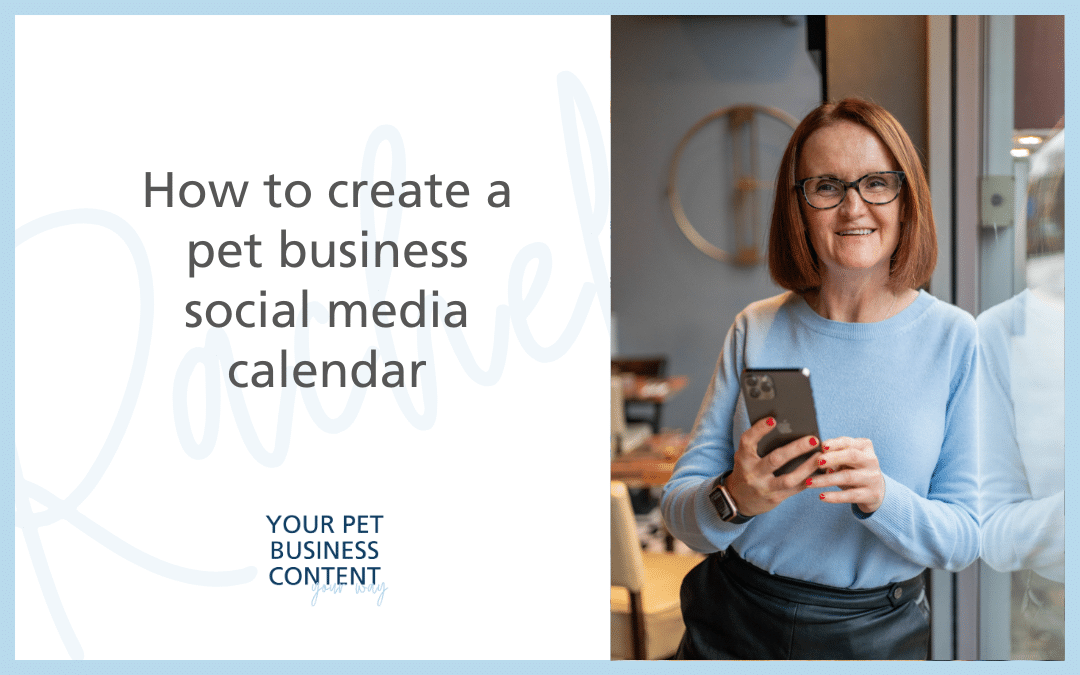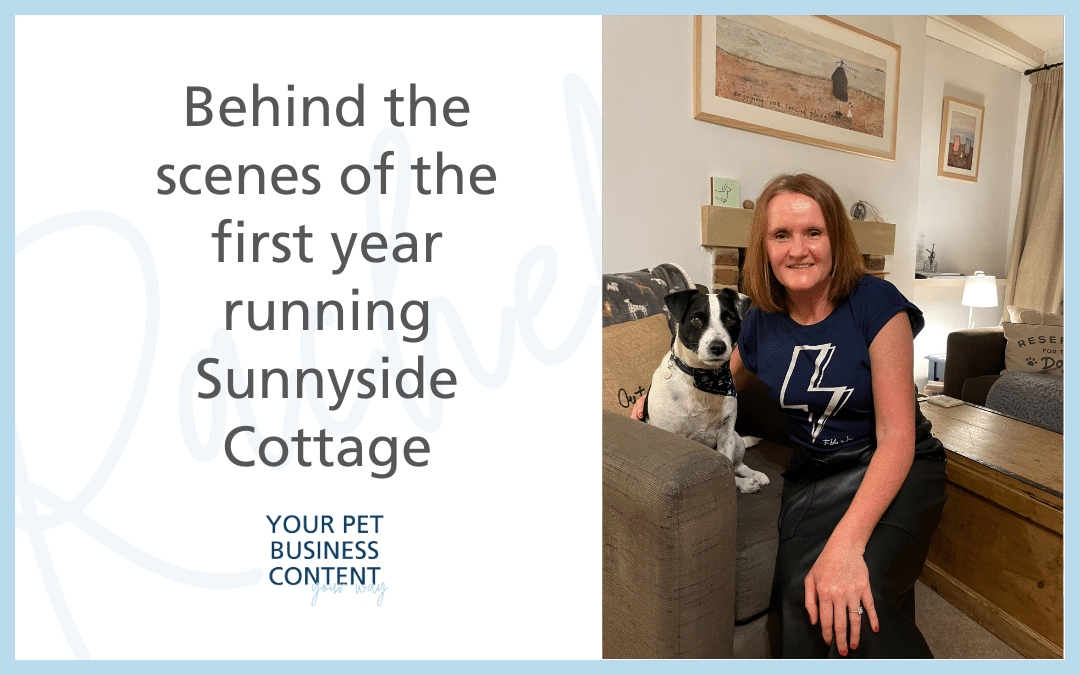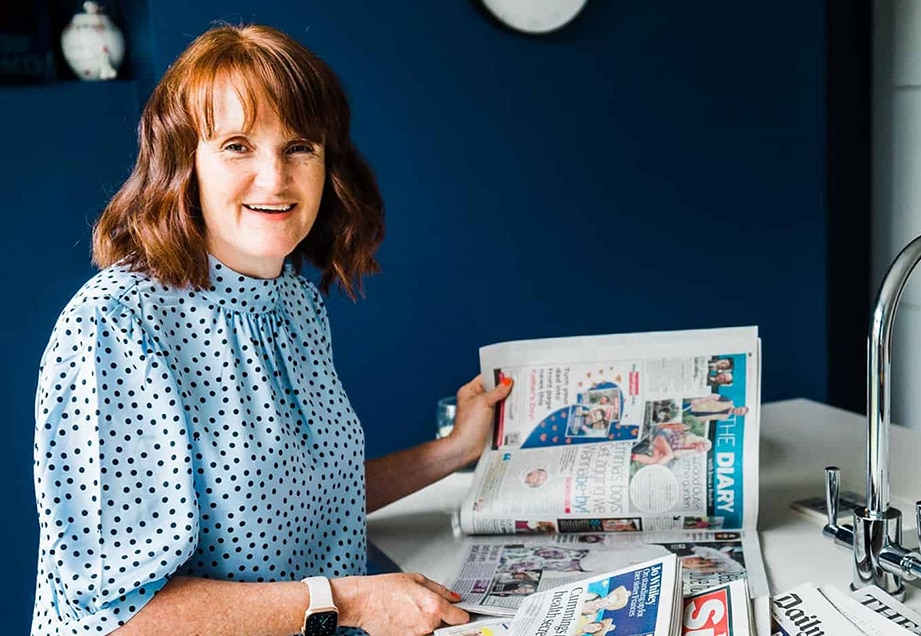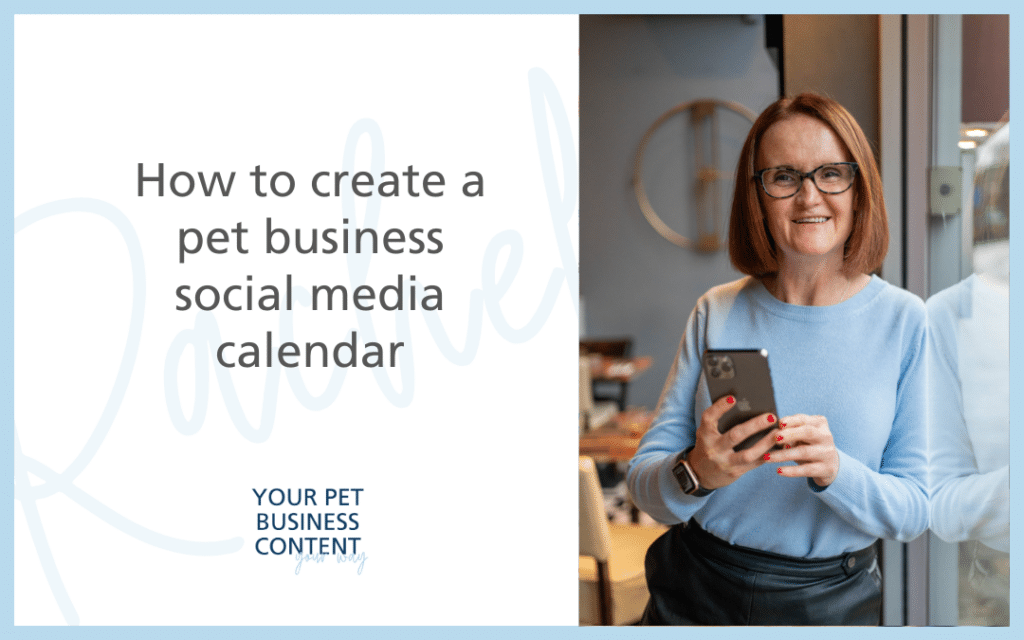Dog trainer Aileen Stevenson’s social media posts are regularly shared dozens of times, attract hundreds of comments a week and power her business.
She creates meaningful content that people connect with, written from the heart, sharing observations from her own dog Charlie and the dogs she supports.
Only five years ago, Aileen was working as an accountant then retrained as a dog trainer and fulfilled her dream of building a successful business.
She’s written a book, Dogs, Bumps and Babies, works one to one in person with families, children and dogs in Glasgow and supports clients online too.
In this episode Aileen shares the story behind her business and how she goes about creating meaningful content to inspire pet parents to think about their relationship with their dogs.
And how using Facebook in particular has helped her to grow her business.
Listen in to our conversation on the player link below and you can read the key points covered as a blog (but believe me you really want to listen to this!)
Can you tell us about how you started your business?
“Yes, I was an accountant for many years then in 2017, I was able to leave my job and fulfil a dream to be a dog trainer. I’m a Karen Prior certified training partner, member of the IMDT and family dog mediator.
“I’ve also written a book, Dogs, Bumps and Babies, on how to go from being a family with a dog to a family with a dog and a baby and making that change as stress free as possible.”
What it was like at the beginning?
“Scary! I built myself a website, and set up a Facebook page, and didn’t really have a clue what I was doing was either either of those things.
“My friends and family would like my content to support me and I used stock images as I had only just started and had no client dogs to photograph and I did very simple posts.”
How did you develop your content to where it is now?
“I had a friend and mentor who was very social media savvy. They really helped and their advice was to be consistent, to keep showing up. I try to post five days out of seven.
“At the beginning it was a bit tumbleweed, it’s easy to be discouraged and stop, but for me what made a difference was just doing it, like any other skill you begin to get better at it.
“It’s the discipline of doing it regularly, it gets the wheels turning. You get more skilled at writing and identifying a good topic and I always try to put a learning point on each post to get people thinking.”
So tell me how you get your ideas?
“I take experiences that happen day to day and make a note of them, but the key thing is writing for the regular dog owner, to help them understand their dogs a little more, why they behave in certain ways and see things in a different way to the old school, obedience style training.
“I want to create empathy and understanding for their dog and to think differently. Inspiration often comes from two people saying the same thing and I’ll think, ‘if you’re thinking this, others are too.’”
What’s your social media planning like?
“I tend to take time at the weekend and look through photos and videos of the week before, think about what might be interesting for people that relates to the image or video.
“I’ll do four or five posts, and sometimes something will happen during the week and I will do an off the cuff post, but I don’t tend to have a structured plan.
“I have a mix of formats, so video, still images, stories, quotes and phrases, so a very loose strategy.”
What do you think makes good social media?
“When you can hear that person talking, you can tell it’s their tone and their voice.
“That’s what people respond to because it’s you, you’ve got to be seen, show who you are, have pictures, video, share a little about your life, your dogs, your walks.
“People get to see me and my dog Charlie. I don’t want to be the centre of attention, but if you’re putting your business out there, you have to share a little of who you are, your personality, a bit of humour, then they have a picture of you in their head of who you are.”
Do you have any advice when taking those first tentative steps?
“First, just do it, no-one is bothered! People want to see you and aren’t looking for your flaws. If you do video, do it off the cuff so it’s more natural.
“Write things that come into your head when you’re out walking and pick topics you can talk about easily.
“Don’t overthink it or think things have to be perfect and keep it simple and write for your clients and normal dog owners, not other pet professionals.”
Can you share your experience of owners’ awareness of modern training methods?
“I’ve had a number of owners who have been to someone, taken them at face value, seen the recommendations and then been asked to do things that made them feel very uncomfortable to their dogs and have searched to train in a different way.
“But the reason they went to the original person is because they didn’t realise there were different ways to train dogs.
“If we (as force free trainers) are quiet and don’t promote ourselves, and get information out there about training kindly and make ourselves visible, then we can’t really complain if people don’t come to us.”
How do you feel about selling in posts?
“Not comfortable! But I feel like my content has helped make it clear the kind of trainer and person I am. I’m fortunate that I have clients now, especially if they ever see the last year or so, where they’ve said, ‘I’ve been watching your stuff for a while.’
“When they call, it’s almost as if they know me. I feel being consistent, being visible, having a consistent message and showing who you are helps connect you to the people who work in the way you want to work.”
How much time do you invest in marketing?
“Sitting down and writing, editing and scheduling for seven posts, would take around two to three hours. The videos and photos I do while working and ask clients first. If it’s off the cuff, it’s about five minutes.
“It helps to schedule a few for the week ahead so it doesn’t feel like a bind. In time you find your personality, style and your voice, and this comes with practice.
“People come to you in a vulnerable position when you’re a dog trainer, they want to know they’re in safe hands.
“It helps to have a picture in their head of who they’re going to be working with when talking about relationship and emotions, it makes it easier to call you or come to the first session.
“That’s why I would say create your own content that says what you’re all about.”
There’s no short cut is there?
“No, it does take time. It’s a central part of the business. I think sometimes trainers are guilty of thinking that these things are like little bolt ons to the training . But marketing is as essential as the training itself.
“If you don’t promote yourself how do people know about you and know they want to work with you. I want people to come to me thinking, ‘You are the right person.’ And to have made the decision before they pick up the phone.”
What’s next for you?
“I’m scoping out another book, it’s puppy related but not a traditional, ‘How to train your puppy book,’ there’s loads of those out there so I want to do something to put my slant on it so that’s my project for 2023.”
Links mentioned in this episode:
Visit Aileen’s website: https://www.theperfectpuppycompany.co.uk/
Follow her on Facebook: https://www.facebook.com/theperfectpuppycompany
Connect on Instagram: https://www.instagram.com/theperfectpuppycompany/
Check out her book on Amazon: https://www.amazon.co.uk/dp/B092PGCXHT
Listen to the Just Bloody Post It podcast with Helen Perry: https://www.helen-perry.co.uk/the-just-bloody-post-it-podcast/
If you enjoyed this post, you might like How to get out your own way and put your pet business out there with Osmaan Shariff, What to do if your peers criticise your content or Write for your clients, not other dog trainers with Erin Moore.









